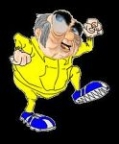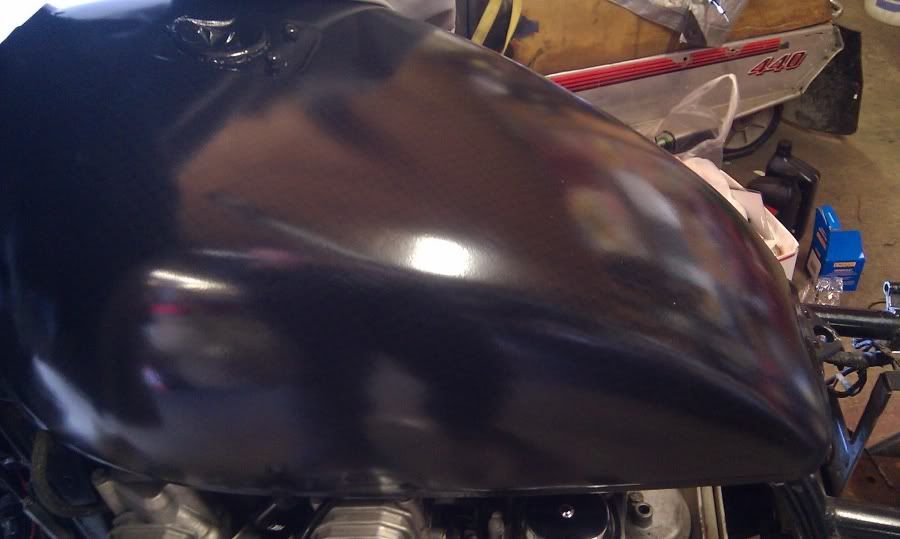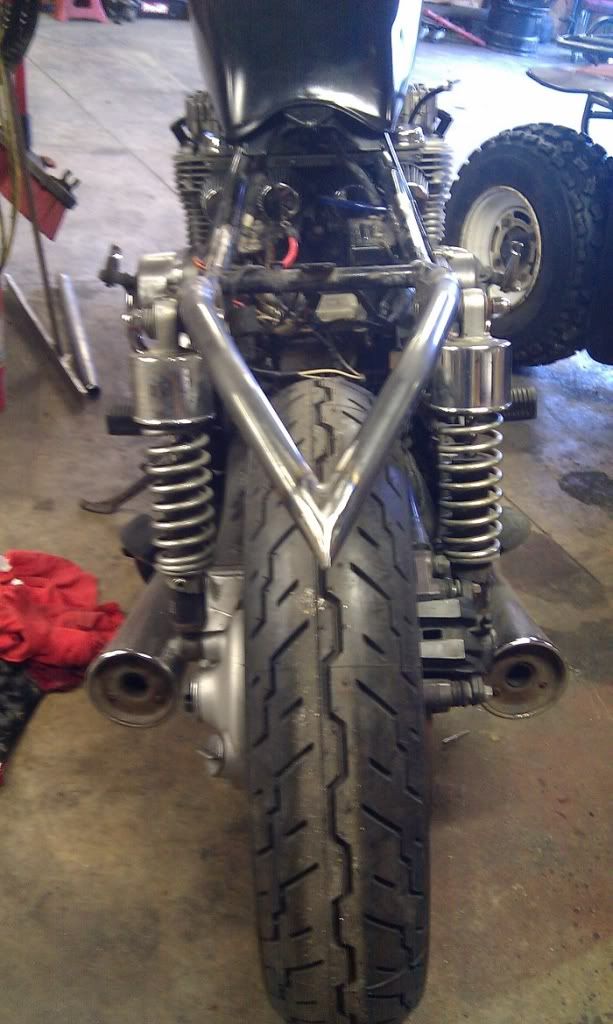KZ1100 LTD Muscle Bike Project
- AJSparko
-
 Topic Author
Topic Author
- Offline
- User
-

Registered
- Posts: 28
- Thanks: 2
Re: KZ1100 LTD Muscle Bike Project
07 Apr 2012 03:44
Got a lot done tonight. Shortened cables, carbs mounted, new oil filter, forks filled and installed with new seals....
Originally I thought of having the wheels powdercoated but decided against it. Want to keep the look of how they were but with a more satin finish on the aluminum. So I degreased them, scuffed them up and shot them with some satin black...
Then followed up with some scuffing of the aluminum for a satin finish, cleaned them up and hit with a coat of satin clear.
I was lucky and scored a set of Michelin tires front and rear for half price. I still need to finish trimming and finish the front fender and the paintwork on the gas tank but I had to sit in place...
Originally I thought of having the wheels powdercoated but decided against it. Want to keep the look of how they were but with a more satin finish on the aluminum. So I degreased them, scuffed them up and shot them with some satin black...
Then followed up with some scuffing of the aluminum for a satin finish, cleaned them up and hit with a coat of satin clear.
I was lucky and scored a set of Michelin tires front and rear for half price. I still need to finish trimming and finish the front fender and the paintwork on the gas tank but I had to sit in place...
Please Log in or Create an account to join the conversation.
- AJSparko
-
 Topic Author
Topic Author
- Offline
- User
-

Registered
- Posts: 28
- Thanks: 2
Re: KZ1100 LTD Muscle Bike Project
11 Apr 2012 23:59
Got some paintwork completed, weather hasn't been cooperating though. I initially painted it black satin and was like... :dry: bleh. Just didn't do anything for me. I thought of some graphic but also wanted to keep it a satin finish so I compromised and went with a scale effect.
During normal light it's pretty subdued.
In sunlight it does become a little more noticeable but I couldn't capture a good pic of it so I just used the flash indoors which made it stand out.
Having a problem with starting the bike though...grrr....I cranked it before I did anything and now nothing. I found the solder joints on the start button were cracked and repaired them. Can't even get the solenoid to click, in neutral, holding the clutch. Have to trace it down another day....
During normal light it's pretty subdued.
In sunlight it does become a little more noticeable but I couldn't capture a good pic of it so I just used the flash indoors which made it stand out.
Having a problem with starting the bike though...grrr....I cranked it before I did anything and now nothing. I found the solder joints on the start button were cracked and repaired them. Can't even get the solenoid to click, in neutral, holding the clutch. Have to trace it down another day....
Please Log in or Create an account to join the conversation.
- MFolks
-

- Offline
- User
-

Registered
- Posts: 6650
- Thanks: 541
Re: KZ1100 LTD Muscle Bike Project
12 Apr 2012 01:04
This happens on these older bikes, as the soldered joints are failing:
Repairing Motorcycle Soldered Connections
When repairing soldered wires on motorcycle switches or light bulbs sockets, have the following on hand:
1. A 25 Watt soldering iron or one that the wattage can be adjusted.
2. Rosin core solder.
3. Rosin flux or soldering paste (Never use solder or soldering paste designed for plumbing work, as it contains an acid that will corrode the electrical joint, ruining it).
4. 91% rubbing Alcohol, or 70%. The lower percentage will clean up flux residue, but not as good as the higher percentage stuff.
5. A cut down ½” paint brush, or acid brush for scrubbing the repaired solder joint.
6. Clean rags or paper towels
7. A damp sponge to keep the soldering iron tip clean.
8. Some “Solder Wick” a braided bare copper wire designed to collect heated excess solder, aiding in joint preperation.
9. Some wooden toothpicks.
10. Small Hemostats or clip on heatsinks.
A. Before soldering, “Tin” the soldering iron tip by plugging it in or turning the iron on, allowing it to get to operating temperature(2-3 minutes).
B. Unroll about 3” of solder from the roll of rosin core solder & then using a clean rag or paper towel moistened with Alcohol, wipe the unrolled solder, removing the finger print oils that will create a poor solder joint.
C. Apply a small amount of solder to the now heated soldering iron tip, wiping the excess off with the wet sponge, keeping a thin layer on the soldering iron.
D. The soldering iron is now ready for use, but before applying the heated tip to a wire, wipe the tip on the damp sponge, this removes any oxidized solder and makes for a much better connection.
E. If the joint to be repaired is grey in color or appears “Crumbled”, apply some rosin soldering paste or flux to the joint with a small toothpick of screwdriver, and then apply the soldering iron tip for a few seconds.
G. The fluxed joint should clean up, allowing for a better connection. If no luck, use the solder wick to remove all traces of the old solder by apply in it between the soldering iron tip and the bad joint.
H. Hemostats and clip on heatsinks will be used to prevent the wire insulation from burning, overheating & pulling away from the connection.
I. Apply a small amount of flux to the joint to be repaired & then a very small duration of heated soldering iron tip & solder.
J. Clean off the repaired joint with the brush & rubbing Alcohol, the newly repaired joint should appear clean and bright, almost as if it were polished, with no voids or holes.
Repairing Motorcycle Soldered Connections
When repairing soldered wires on motorcycle switches or light bulbs sockets, have the following on hand:
1. A 25 Watt soldering iron or one that the wattage can be adjusted.
2. Rosin core solder.
3. Rosin flux or soldering paste (Never use solder or soldering paste designed for plumbing work, as it contains an acid that will corrode the electrical joint, ruining it).
4. 91% rubbing Alcohol, or 70%. The lower percentage will clean up flux residue, but not as good as the higher percentage stuff.
5. A cut down ½” paint brush, or acid brush for scrubbing the repaired solder joint.
6. Clean rags or paper towels
7. A damp sponge to keep the soldering iron tip clean.
8. Some “Solder Wick” a braided bare copper wire designed to collect heated excess solder, aiding in joint preperation.
9. Some wooden toothpicks.
10. Small Hemostats or clip on heatsinks.
A. Before soldering, “Tin” the soldering iron tip by plugging it in or turning the iron on, allowing it to get to operating temperature(2-3 minutes).
B. Unroll about 3” of solder from the roll of rosin core solder & then using a clean rag or paper towel moistened with Alcohol, wipe the unrolled solder, removing the finger print oils that will create a poor solder joint.
C. Apply a small amount of solder to the now heated soldering iron tip, wiping the excess off with the wet sponge, keeping a thin layer on the soldering iron.
D. The soldering iron is now ready for use, but before applying the heated tip to a wire, wipe the tip on the damp sponge, this removes any oxidized solder and makes for a much better connection.
E. If the joint to be repaired is grey in color or appears “Crumbled”, apply some rosin soldering paste or flux to the joint with a small toothpick of screwdriver, and then apply the soldering iron tip for a few seconds.
G. The fluxed joint should clean up, allowing for a better connection. If no luck, use the solder wick to remove all traces of the old solder by apply in it between the soldering iron tip and the bad joint.
H. Hemostats and clip on heatsinks will be used to prevent the wire insulation from burning, overheating & pulling away from the connection.
I. Apply a small amount of flux to the joint to be repaired & then a very small duration of heated soldering iron tip & solder.
J. Clean off the repaired joint with the brush & rubbing Alcohol, the newly repaired joint should appear clean and bright, almost as if it were polished, with no voids or holes.
1982 GPZ1100 B2
General Dynamics/Convair 1983-1993
GLCM BGM-109 Tomahawk, AGM-129A Advanced Cruise Missile (ACM)
General Dynamics/Convair 1983-1993
GLCM BGM-109 Tomahawk, AGM-129A Advanced Cruise Missile (ACM)
Please Log in or Create an account to join the conversation.
- MFolks
-

- Offline
- User
-

Registered
- Posts: 6650
- Thanks: 541
Re: KZ1100 LTD Muscle Bike Project
12 Apr 2012 01:06
Cleaning Motorcycle Electrics
Get some of the De-Oxit electrical contact cleaner and figure on spending a good day going from the front of the bike to the back. It’s a plastic safe cleaner/preservative. www.deoxit.com is their website. Or use any plastic safe electrical contact cleaner(NOT WD-40 !).
On the older Kawasaki's, a majority of electrical connectors are inside the headlight housing requiring removal of the headlight, then the fun begins.
Do one set of electrical connectors at a time to avoid mixing up what connects to where. Usually disconnecting, spraying with De-Oxit and reconnecting is about all you'll need.
However, when encountering the green crud of corrosion, a brass wire brush may be needed on the pins you can reach. Some 400-600 grit wet and dry sandpaper strips rolled into a tube should reach the male and female pins in the more difficult to clean connectors.
Smoker’s pipe cleaners, cotton swabs and wooden toothpicks work as cleaning aids.
Really small electrical connectors may require the use of a welders tip cleaning tool assortment.
Most pins in the connectors are coated with a thin plating of tin, and others may be nothing more than copper or brass.
If moisture is added, the resulting corrosion lowers the voltage/current being carried causing dim lights, slow engine cranking, slow turn signal responce and lower input voltage to the ignition coils resulting in weak spark.
The left and right handlebar switch pods will need attention too as they have circuit functions like turn, horn, run/stop, and start. The older Kawasaki’s have reports of the soldered connections crumbling, if your bike has this problem, just ask, as I’ve got a repair procedure for this.
Usually a spritz or two with actuation of the switch is about all needed for these switches unless corrosion is detected and then careful disassembly is required.
The ignition switch may or may be not sealed to allow spraying the internal contacts. I urge caution if attempting to open this up as springs, and ball bearings may fly out never to be seen again!
If your bike has the older style glass tubed fuses, I suggest replacing them as vibration can cause internal failure. AGX is the type used, and most auto parts stores can get them for you.
Clean the fuse holder clips, looking for signs of overheating(discolored insulation, signs of melting). I use metal polish on a cotton swab, followed by spraying another clean swab with the De-Oxit and then rubbing the inside of the fuse clip.
All battery cables must be clean and tight for maximum current transfer. Check the cables going from the Negative(-) battery terminal/post to the engine mounting bolt
Also the one going from the Positive(+) terminal to the starter solenoid and from there to the starter motor.
If any battery cable feels ”Crunchy” when flexed, replace it as possible corrosion is inside the insulation.
Each "Bullet Connector" will have to be sprayed to ensure good connectivity, especially the ones going to the energizing coil of the starter solenoid.
The alternator output “Bullet Connectors” are usually behind the engine sprocket cover and will need inspecting and cleaning too.
The turn signal light sockets will benefit from a spritz from the contact cleaner along with the tail light/brake light socket.
Some brake light switches can be sprayed on the actuating rod, with the spray running down inside to the electrical contacts, others may be sealed requiring replacement if the switch is intermittent in operation.
Some people put the Di-Electric Grease on cleaned terminations/connectors, I don’t, as I’ve read/heard it can cause problems when it gets hot, actually insulating the connections, so the choice is yours to use or not.
I think I've covered about all of the electrical systems on the bike.........
“I spent a weekend going through every electrical connection and switch on the bike with a little scotchbrite pad and DeOxit - what a difference! Everything was brighter, gauge backlights, indicator lights, turn signals, I was getting a nicer spark, it fired up quicker, etc. Well worth my time. WELL worth it! “
From a forum member at www.kzrider.com
Get some of the De-Oxit electrical contact cleaner and figure on spending a good day going from the front of the bike to the back. It’s a plastic safe cleaner/preservative. www.deoxit.com is their website. Or use any plastic safe electrical contact cleaner(NOT WD-40 !).
On the older Kawasaki's, a majority of electrical connectors are inside the headlight housing requiring removal of the headlight, then the fun begins.
Do one set of electrical connectors at a time to avoid mixing up what connects to where. Usually disconnecting, spraying with De-Oxit and reconnecting is about all you'll need.
However, when encountering the green crud of corrosion, a brass wire brush may be needed on the pins you can reach. Some 400-600 grit wet and dry sandpaper strips rolled into a tube should reach the male and female pins in the more difficult to clean connectors.
Smoker’s pipe cleaners, cotton swabs and wooden toothpicks work as cleaning aids.
Really small electrical connectors may require the use of a welders tip cleaning tool assortment.
Most pins in the connectors are coated with a thin plating of tin, and others may be nothing more than copper or brass.
If moisture is added, the resulting corrosion lowers the voltage/current being carried causing dim lights, slow engine cranking, slow turn signal responce and lower input voltage to the ignition coils resulting in weak spark.
The left and right handlebar switch pods will need attention too as they have circuit functions like turn, horn, run/stop, and start. The older Kawasaki’s have reports of the soldered connections crumbling, if your bike has this problem, just ask, as I’ve got a repair procedure for this.
Usually a spritz or two with actuation of the switch is about all needed for these switches unless corrosion is detected and then careful disassembly is required.
The ignition switch may or may be not sealed to allow spraying the internal contacts. I urge caution if attempting to open this up as springs, and ball bearings may fly out never to be seen again!
If your bike has the older style glass tubed fuses, I suggest replacing them as vibration can cause internal failure. AGX is the type used, and most auto parts stores can get them for you.
Clean the fuse holder clips, looking for signs of overheating(discolored insulation, signs of melting). I use metal polish on a cotton swab, followed by spraying another clean swab with the De-Oxit and then rubbing the inside of the fuse clip.
All battery cables must be clean and tight for maximum current transfer. Check the cables going from the Negative(-) battery terminal/post to the engine mounting bolt
Also the one going from the Positive(+) terminal to the starter solenoid and from there to the starter motor.
If any battery cable feels ”Crunchy” when flexed, replace it as possible corrosion is inside the insulation.
Each "Bullet Connector" will have to be sprayed to ensure good connectivity, especially the ones going to the energizing coil of the starter solenoid.
The alternator output “Bullet Connectors” are usually behind the engine sprocket cover and will need inspecting and cleaning too.
The turn signal light sockets will benefit from a spritz from the contact cleaner along with the tail light/brake light socket.
Some brake light switches can be sprayed on the actuating rod, with the spray running down inside to the electrical contacts, others may be sealed requiring replacement if the switch is intermittent in operation.
Some people put the Di-Electric Grease on cleaned terminations/connectors, I don’t, as I’ve read/heard it can cause problems when it gets hot, actually insulating the connections, so the choice is yours to use or not.
I think I've covered about all of the electrical systems on the bike.........
“I spent a weekend going through every electrical connection and switch on the bike with a little scotchbrite pad and DeOxit - what a difference! Everything was brighter, gauge backlights, indicator lights, turn signals, I was getting a nicer spark, it fired up quicker, etc. Well worth my time. WELL worth it! “
From a forum member at www.kzrider.com
1982 GPZ1100 B2
General Dynamics/Convair 1983-1993
GLCM BGM-109 Tomahawk, AGM-129A Advanced Cruise Missile (ACM)
General Dynamics/Convair 1983-1993
GLCM BGM-109 Tomahawk, AGM-129A Advanced Cruise Missile (ACM)
Please Log in or Create an account to join the conversation.
- MFolks
-

- Offline
- User
-

Registered
- Posts: 6650
- Thanks: 541
Re: KZ1100 LTD Muscle Bike Project
12 Apr 2012 01:10
You will need this for engine work and other maintenance:
www.kawiworld.com/index.php?option=com_c...icle&id=77&Itemid=99
www.kawiworld.com/index.php?option=com_c...icle&id=77&Itemid=99
1982 GPZ1100 B2
General Dynamics/Convair 1983-1993
GLCM BGM-109 Tomahawk, AGM-129A Advanced Cruise Missile (ACM)
General Dynamics/Convair 1983-1993
GLCM BGM-109 Tomahawk, AGM-129A Advanced Cruise Missile (ACM)
Please Log in or Create an account to join the conversation.
- AJSparko
-
 Topic Author
Topic Author
- Offline
- User
-

Registered
- Posts: 28
- Thanks: 2
Re: KZ1100 LTD Muscle Bike Project
15 Apr 2012 17:43
Electrical I don't mind so much since I have A LOT of experience in both auto and PCB inspection/repair. Went through all the connections, resoldered all switches, cleaned all contacts and found a couple of questionable grounds....fired right up.
Intake boots were questionable and that was confirmed by several leaks. Didn't let it run for long but it ran so very smooth with that classic Kawi sound.
Intake boots were questionable and that was confirmed by several leaks. Didn't let it run for long but it ran so very smooth with that classic Kawi sound.
Please Log in or Create an account to join the conversation.
- MFolks
-

- Offline
- User
-

Registered
- Posts: 6650
- Thanks: 541
Re: KZ1100 LTD Muscle Bike Project
15 Apr 2012 19:59
Inspect,clean & lubricate the mechanical ignition advancer now and then,(it's behind a CD sized engine cover on the right side).Some lubrication like sewing machine or 3-in-one oil on the moving parts is about all it needs.
1982 GPZ1100 B2
General Dynamics/Convair 1983-1993
GLCM BGM-109 Tomahawk, AGM-129A Advanced Cruise Missile (ACM)
General Dynamics/Convair 1983-1993
GLCM BGM-109 Tomahawk, AGM-129A Advanced Cruise Missile (ACM)
Please Log in or Create an account to join the conversation.
- Gary - K7GLD
-

- Offline
- User
-

Registered
- 1983 1100LTD
- Posts: 135
- Thanks: 17
Re: KZ1100 LTD Muscle Bike Project
15 Apr 2012 22:59
OP sounds like he's pretty well experienced and knows what he's doing - doubt he needs much beginner's tutorials...  :lol:
:lol:
John Day area - Eastern Oregon
Restored 1983 Kawasaki 1100LTD
Restored 1983 Kawasaki 1100LTD
Please Log in or Create an account to join the conversation.
- AJSparko
-
 Topic Author
Topic Author
- Offline
- User
-

Registered
- Posts: 28
- Thanks: 2
Re: KZ1100 LTD Muscle Bike Project
17 Apr 2012 00:34Gary - K7GLD wrote: OP sounds like he's pretty well experienced and knows what he's doing - doubt he needs much beginner's tutorials...:lol:
Please Log in or Create an account to join the conversation.
- AJSparko
-
 Topic Author
Topic Author
- Offline
- User
-

Registered
- Posts: 28
- Thanks: 2
Re: KZ1100 LTD Muscle Bike Project
19 Apr 2012 00:41
Intake boots should be here by the weekend so I'm working on all the little stuff. Taillights at the moment. I have small, short stalk signals all the way around and wanted something very compact for taillights. Also I can't seem to make anything easy for myself....
I'm not sure on how to terminate the end towards the seat. Thinking of leaving it the way it is but thought of also sloping it downward. But I think if I do it'll just make it look more "pod-like" and I'll hate it.
I'm not sure on how to terminate the end towards the seat. Thinking of leaving it the way it is but thought of also sloping it downward. But I think if I do it'll just make it look more "pod-like" and I'll hate it.
Please Log in or Create an account to join the conversation.
- AJSparko
-
 Topic Author
Topic Author
- Offline
- User
-

Registered
- Posts: 28
- Thanks: 2
Re: KZ1100 LTD Muscle Bike Project
19 Apr 2012 13:58
New intake boots helped but didn't fix my problem. Won't run at all on no choke. Runs great with choke in middle position though. Let it warm up and push choke in and it is definitely a fuel starvation. Carbs coming back off for a more thorough cleaning. It was pretty late one night I did it so....yeah...who knows what I missed. :whistle:
Please Log in or Create an account to join the conversation.
- AJSparko
-
 Topic Author
Topic Author
- Offline
- User
-

Registered
- Posts: 28
- Thanks: 2
Re: KZ1100 LTD Muscle Bike Project
01 May 2012 21:29
Was going to just trim down the seat, but I stuck it on there and it's HUGE and looks out of place now. Hate the seat, hate the fender, hate the taillights...
CHOP IT OFF....took off back section of frame, all the tabs and latches for helmet and seat.
Quick mockup...
Plugged the frame and slipped over new section. Will still need to throw in reinforcement and crossbar..initially was going to roll the tube but there's no other "rolled" lines in the KZ. Frame is a series of bends and I wanted to continue that.
Will skin it and start on a seat pan out of fiberglass, figure out a new taillight setup.
CHOP IT OFF....took off back section of frame, all the tabs and latches for helmet and seat.
Quick mockup...
Plugged the frame and slipped over new section. Will still need to throw in reinforcement and crossbar..initially was going to roll the tube but there's no other "rolled" lines in the KZ. Frame is a series of bends and I wanted to continue that.
Will skin it and start on a seat pan out of fiberglass, figure out a new taillight setup.
Please Log in or Create an account to join the conversation.
Moderators: Street Fighter LTD












